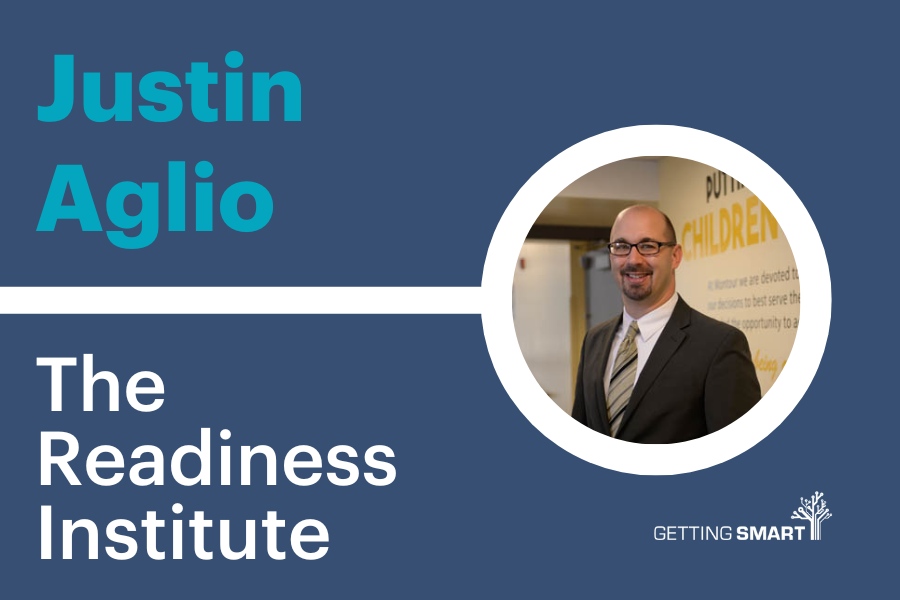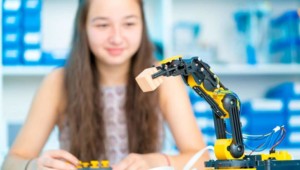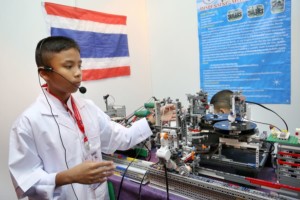Justin Aglio on the Readiness Institute
Key Points
-
In pasta making, you need great ingredients and time – it’s the same with education.

What would an economy look like that centered justice, regenerativity and collaboration? Want to play a role? Find out more about the Next Economy MBA from LIFT Economy.
On this episode of the Getting Smart Podcast Tom Vander Ark is joined by Dr. Justin Aglio, the Executive Director of the Readiness Institute at Penn State University. Previously, Justin was a district leader in Montour School District, one of the first districts to pilot the AI+Ethics middle-grade curriculum.
Readiness doesn’t mean getting ready for something, it means being ready for anything.
Justin Aglio
Tom Vander Ark: Justin, what does readiness mean to you?
Justin Aglio: Readiness to me doesn’t mean getting ready for something; it means being ready for anything. So, as we think about any situation we get into—any transitional or transformational phase in our life—having the skills to be ready for anything is readiness to me.
Tom Vander Ark: You’re listening to the Getting Smart Podcast, and I’m Tom Vander Ark. Today I’m talking to my friend, Dr. Justin Aglio. He’s the Executive Director of the Readiness Institute at the Pennsylvania State University. Justin, so good to see you again.
Justin Aglio: So great to see you as always, Tom.
Tom Vander Ark: Justin, I was thinking back almost a decade ago to when we met in Pittsburgh. I think it was at the Environmental Charter School, right?
Justin Aglio: That’s correct. I emailed you and said, “Come visit the most innovative school in the world,” and you emailed me back right away and said, “How can I pass that invitation up?”
Tom Vander Ark: Justin, since the day we met, I’ve been impressed that you have always been a responsive educator, always thinking about this topic of readiness and what it means. Several times in your career, you’ve redefined readiness. I loved visiting you at the Environmental Charter School, where you had been a principal at a couple of other great schools. What was exciting to you about their mission?
Justin Aglio: The mission was that learning could take place anywhere, and learning had to be authentic. I think back to some of the lessons we had—like studying diversity by going out to Frick Park, sitting by a tree, and journaling about what diversity looks like in nature. Then, back in the classroom, we studied diversity in terms of literacy, like character setting. We tried to connect nature and relevant, authentic experiences for students with our learning objectives.
Tom Vander Ark: Environmental Charter School was one of the best examples of what I’d now call place-based learning. You really took advantage of Frick Park in your backyard. It was also one of the first schools focused on sustainability, both in how you operated and across the curriculum. I’d love to see thousands of schools like that around the country these days.
Justin Aglio: It was a great experience, and the mission and team there—from founder John McCann, who started it by himself and still leads it—have grown the organization from kindergarten all the way through high school. It’s a great example of what education can look like.
Tom Vander Ark: You went on to be a district leader in the Montour School District near Pittsburgh, and I had the chance to visit you a couple of times. You continued to be a responsive education leader. I think, Justin, you were probably the first school district in the country to pilot the AI + Ethics curriculum from the Media Lab at MIT. Is that right?
Justin Aglio: Yeah, that’s correct. We didn’t just pilot the curriculum; we were actually the first school district in the country to work with Blakely Hoffman to implement it in the classroom. Blakely was amazing; she spent a week on our campus, beta-testing the AI ethics curriculum. We wanted to teach artificial intelligence, but we knew we couldn’t do it without teaching ethics alongside it.
Tom Vander Ark: Why middle grades for you and MIT? That was an interesting choice. Why introduce AI to middle school students?
Justin Aglio: We started with middle school because we looked at the average age of kids getting a cell phone—it was around 11 or 12. Students were already downloading apps and being exposed to AI daily. Our goal wasn’t to teach them how to program AI but to make them aware of what AI is and how it influences their lives. We wanted them to be not just consumers of AI but also producers who understand its applications across all fields, whether sciences, math, social studies, or anything else.
Tom Vander Ark: A couple of years ago, you had the chance to work with leaders at Penn State to develop a new institute, the Readiness Institute. What was the origin story and the purpose of that new organization?
Justin Aglio: The origin story began with the Heinz Endowments in Pittsburgh, specifically Stanley Thompson. Dr. Thompson gathered educators, community leaders, and industry leaders to discuss how we were preparing students. We realized we were getting kids ready for college and jobs, but we weren’t ensuring they were ready to succeed there. They wanted Penn State as a partner because it’s Pennsylvania’s only land-grant university with the mission of outreach and service, which aligned perfectly with the goals of the Readiness Institute.
Tom Vander Ark: Let’s talk about Penn State. It’s one of America’s largest universities and Pennsylvania’s only land-grant institution. Is it fair to call it a statewide institution?
Justin Aglio: Absolutely. 96% of Pennsylvania residents live within 30 miles of a Penn State campus. With over 20 campuses, Penn State leads in economic development across the state, producing graduates who are going on to lead and innovate in various fields.
Tom Vander Ark: Enrollment near 100,000—it’s a big institution with great graduate programs and a thriving online university.
Justin Aglio: It really is a thriving university. I’m honored to work with Penn State’s leadership, like President Ben DePuyt and others, who are all so mission-driven. Everyone is focused on outreach and service to make Pennsylvania future-ready.
Tom Vander Ark: Justin, you’re a great spokesperson for Penn State. Over the last few months, you’ve worked closely with President Ben DePuyt. Was that a good experience?
Justin Aglio: It’s been tremendous. President Ben DePuyt brings so much energy to the university and is very student-focused. That aligns with our learner-centered mission at the Readiness Institute, ensuring students have the resources they need to succeed.
Tom Vander Ark: It’s a challenging time to be in higher education. While enrollments are up at the main campus, some campuses have struggled. How are you adapting?
Justin Aglio: It’s more of an opportunity than a challenge. We’re refocusing on community needs, with campuses that adapt to local changes. We’re also working with high schools and communities to help people reskill and upskill, offering Penn State’s resources to prepare everyone for the future.
Tom Vander Ark: So, how are you doing that? The Readiness Institute started in Pittsburgh but has expanded statewide. Tell us about some of your programs.
Justin Aglio: We launched in 2020 with a Hope Moonshot project, collecting hopes from 37 countries. Those hopes will be sent to the moon on the first space shuttle mission since Apollo. We say readiness begins with hope, and from that, we’ve launched various programs, including summer programs, workshops, and boot camps across career pathways.
Tom Vander Ark: Let’s talk more about artificial intelligence. You’ve had a great partnership with Mark Cuban’s foundation, which helped launch AI boot camps. Can you tell us about those?
Justin Aglio: The Mark Cuban Foundation has been a fantastic partner, helping us run two years of successful AI boot camps. High school students come in for four Saturdays to learn about machine learning, facial recognition, and ethics, with guest speakers like Mark Cuban himself. The boot camps started in Pittsburgh but now run in 29 cities across the U.S.
Tom Vander Ark: Is the AI boot camp’s goal to get more kids into computer science or to help them understand AI’s broader applications?
Justin Aglio: Both. The camp is about exposing students to AI and helping them take their knowledge to the next level. They work on projects and learn how AI can be used for good in their communities.
Tom Vander Ark: Do you offer summer programming or other programs besides the AI boot camp?
Justin Aglio: Yes, our flagship program is a summer program for rising high school seniors. They spend six weeks exploring career pathways and learning essential skills. We also provide monthly workshops and stay with the students for life, supporting them with scholarship workshops, FAFSA guidance, and more.
Tom Vander Ark: It sounds like the Readiness Institute aligns well with the Pathways campaign we’re running at Getting Smart, with pillars like expanded access to quality programming, mentorship, and guidance. Your programs are a great example.
Justin Aglio: Absolutely. At the Readiness Institute, we say our success is our students’ success. We stay connected with them for life, unbundling our summer program into workshops across Pennsylvania to have a broader impact.
Tom Vander Ark: It’s exciting to see your statewide impact. I imagine this will build a pipeline for Penn State but also encourage more kids to go to college, wherever they go.
Justin Aglio: We’re here as the Readiness Institute, not just for Penn State but to support students in general. We work with them, regardless of where they end up going, and focus on community readiness as the foundation of future readiness.
Tom Vander Ark: We’ve been talking to Dr. Justin Aglio, the Executive Director of the Readiness Institute at Penn State. Justin, I know you’re an Italian vegetarian chef. Did you make anything interesting over the weekend?
Justin Aglio: Sundays are pasta day at our house. I’ve been making pasta every Sunday for 20 years, a tradition I learned from my grandmother. There’s a lot of similarity between pasta making and education. In pasta making, you need fresh, good ingredients, and in education, you need great resources. Making pasta takes time and patience—just like education. And in both, there’s no one way to do it; if the dough is too dry, you add water; if it’s too wet, you add flour. Similarly, every student is different, and you need to adjust your approach to meet each student’s needs
Tom Vander Ark: That’s awesome. I’m always inspired by your pasta-making tradition. I don’t make it every Sunday, but that’s a terrific family tradition.
Justin Aglio: Next Sunday, I’m actually making pasta for 35 people, so it’s going to be a big day! But that’s what I love—planning, making it from scratch, and sharing it with family and friends.
Tom Vander Ark: Are you just using sauce from a jar, or are you making something special?
Justin Aglio: Oh, we always make something special! I like to go to the grocery store that morning and see what inspires me. Maybe a red sauce, maybe something else—whatever speaks to me that day.
Tom Vander Ark: Justin, if people want to learn more about the Readiness Institute, where would you send them?
Justin Aglio: They can visit our website at readinessinstitute.psu.edu or follow us on social media on Twitter and Instagram at @RIatPennState. We’d love for people to connect with us, learn with us, and join us in making the world a better place. We’re a learning organization, and we’re here to serve and engage communities.
Tom Vander Ark: Justin, it’s so great to reconnect. I love following you on Twitter—you light up my day with something inspiring most days. Thank you for being here.
Justin Aglio: Thank you as well, Tom. It’s always a pleasure.
Tom Vander Ark: Thanks to our producer, Mason Pasha, and the whole Getting Smart team for making this possible. And until next week, keep learning, keep leading, and, like Justin, keep innovating for equity.
Links:








0 Comments
Leave a Comment
Your email address will not be published. All fields are required.